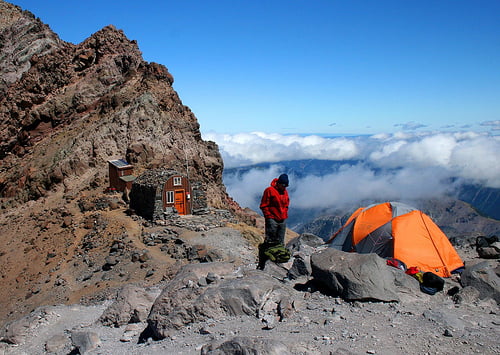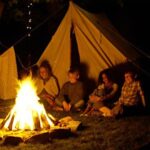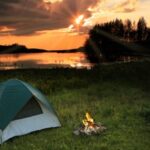by Timothy Martinez Jr.

While taking a cross-country drive from New York City to Los Angeles this summer, I stopped to visit friends who live just outside Denver. Although I didn’t have enough time to go camping in the mountains, I heard some amazing stories about hiking up beautiful fourteeners.
If you’re not familiar with Colorado, the state has 53 fourteeners (mountains that exceed 14,000 ft. above sea level). Hiking 14ers, and especially higher mountains, is not for the lighthearted. In order to get to certain peaks, you have to make long treks that take days.
This is where we come in. Camping at higher altitudes, whether 14,000 or 20,000 ft., is far different than camping close to sea level and requires extra knowledge.
Here are some things to remember and watch out for when camping at high altitudes.
Altitude Sickness
Also known as Acute Mountain Sickness, altitude sickness commonly occurs around 8,000 ft. and varies in severity. Light symptoms include nausea, fatigue (though climbing mountains will do that to you), dizziness, insomnia and more. Altitude sickness usually goes away after a few days, but if it doesn’t, get down as quickly as possible. Extremely high altitudes could result in brain swelling and fluid in the lungs, so be cautious.
Altitude sickness happens most often in people who go from low to high altitudes very quickly. So, as you’re hiking and camping, make sure you give yourself time to acclimate to certain altitudes by resting and keeping yourself hydrated.
Weather
Camping at high altitude means you’re very susceptible to the weather and usually far from help. Weather is particularly mercurial at these heights. One minute it might be sunny and the next it’ll be snowing. Take extra clothing, so you won’t be caught in the cold.
Wind
Along the same vein as weather, high winds are common. Make sure everything in your campsite is secured to the ground. Using stakes or ropes to keep your tent down will prevent it from tumbling all the way down the mountain.
Sun
The higher you go, the less protection you have from the sun. Sunscreen is a must at these heights or else you will get sunburned, so apply liberally.
Equipment
At higher altitudes, there’s less oxygen in the air, which means it’s much harder to make fires. Regular camp stoves will not work very well, so you should remember to take a high-altitude camp stove.



